Gambling facts reveal a captivating narrative that intertwines with the evolution of human civilization, reflecting our enduring fascination with chance and risk. Across centuries and cultures, from ancient Rome to modern online gambling platforms, betting has transformed into a multi-billion dollar industry that both entertains and captivates millions. However, beneath this glittering surface lies a web of gambling myths and misconceptions that can distort reality and mislead participants. Understanding the gambling history alongside its associated gambling truths is essential for anyone looking to engage responsibly in this enticing activity. As we explore these elements further, we will also shine a light on pressing issues like gambling addiction, highlighting the importance of awareness in today’s dynamic gambling landscape.
When we delve into the world of wagering, we uncover an intricate tapestry woven with tales of betting and stakes that span centuries. This thrilling pursuit, often synonymous with chance, encompasses a range of activities—from traditional games of skill and luck to the modern-day revolution of online betting. In this exploration, we’ll dissect not only the historical context of gambling but also the numerous myths that have emerged alongside its evolution. Beyond mere entertainment, understanding the reality of wagering is crucial for maintaining a healthy relationship with this time-honored practice. Additionally, recognizing the nuances of gambling addiction provides a framework for fostering responsible engagement within this vibrant entertainment sector.
Gambling Facts: Unraveling Historical Myths
The history of gambling is a tapestry woven with tales of human interaction, culture, and commerce. Long before the establishment of online casinos and regulated betting, forms of gambling flourished in ancient civilizations like China, where the earliest known lottery dates back to the Han dynasty. Interestingly, these ancient practices reveal that gambling has always been more than mere chance; it has often been a reflection of societal values and the human desire for risk and reward. Examining such historical contexts enlightens us on how the gambling landscape has transformed, embedding itself within legal frameworks and progressively evolving into what we see today with the advent of technology.
Yet, despite the rich gambling history, numerous myths persist, often clouding our understanding of its practices. One prevalent myth suggests that gambling was conceived primarily as a means for the wealthy to maintain their status. Conversely, evidence shows that people from all walks of life have engaged in gambling, often as a unifying social activity. The misconceptions surrounding gambling history not only detract from its cultural significance but also perpetuate stereotypes that discourage new participants from understanding the true nature of gambling engagement.
Understanding Gambling Addiction: Facts and Myths
Gambling addiction is a significant concern that calls for a nuanced understanding, particularly regarding its implications in today’s fast-paced gambling environment. It’s easy to fall into the trap of believing that all gambling is destined to result in addiction for certain individuals, but in reality, addiction stems from a combination of factors, including psychological, emotional, and social influences. As we explore gambling addiction, recognizing that it is not solely due to the act of gambling but rather a complex interplay of personal circumstances can help dismantle this oversimplified view. This perspective emphasizes the need for education and support systems that address the rich tapestry of reasons behind compulsive behavior.
Another prevalent myth is the notion that individuals who experience gambling addiction simply lack self-control or are inherently weak. This stigma can prevent those afflicted from seeking the help they desperately need. The truth is that gambling addiction often shares characteristics with other forms of addiction, where neurological changes can predispose someone to compulsive behaviors. Acknowledging that gambling addiction is a serious mental health issue opens the door for compassion and understanding, enabling affected individuals to access the necessary support systems. As society continues to evolve, promoting awareness and education surrounding gambling addiction remains paramount to fostering a healthier relationship with gambling.
Frequently Asked Questions
What are some historical facts about gambling that influence today’s practices?
The history of gambling stretches back thousands of years, with evidence of betting found in ancient civilizations like the Greeks and Romans. Notably, gambling was even a factor in events like papal elections in the Middle Ages, showcasing its deep societal integration. Understanding these historical gambling facts helps modern players appreciate the regulations and cultural attitudes that shape contemporary gambling practices.
What are common myths about gambling and how do they contradict the truth?
Common gambling myths include beliefs like ‘the house always wins’ and that high rollers receive better odds. These myths mislead gamblers by oversimplifying the complexities of games. In reality, while casinos maintain a statistical edge, understanding game dynamics can empower players. Discerning these myths from gambling truths is vital for responsible gaming and enhancing the overall gambling experience.
| Topic | Key Points |
|---|---|
| History | Gambling dates back centuries and is deeply rooted in various cultures, including ancient Greeks and Romans. |
| Myths | Common misconceptions include: ‘The house always wins’, ‘High rollers get better odds’, and ‘You can beat the system’. |
| Evolution | Modern gambling has evolved with technology, particularly online platforms that promote safe gambling practices. |
| Gambling Addiction | Understanding the risk of addiction is vital, as gambling can shift from a pastime to a compulsion for some. |
Summary
Gambling facts reveal a fascinating history intertwined with human culture, making it essential to approach this activity with knowledge and understanding. As we explore the historical context, prevalent myths, and the potential for addiction, we acknowledge gambling as more than just a form of entertainment; it represents a complex web of social interactions, economic implications, and personal experiences. By debunking myths and confronting the realities of gambling, individuals can engage more responsibly, enjoying the thrill while being mindful of the risks. As the gambling landscape continues to evolve with technology, the importance of educating oneself cannot be overstated, ensuring that we appreciate the captivating world of gambling in its entirety.
